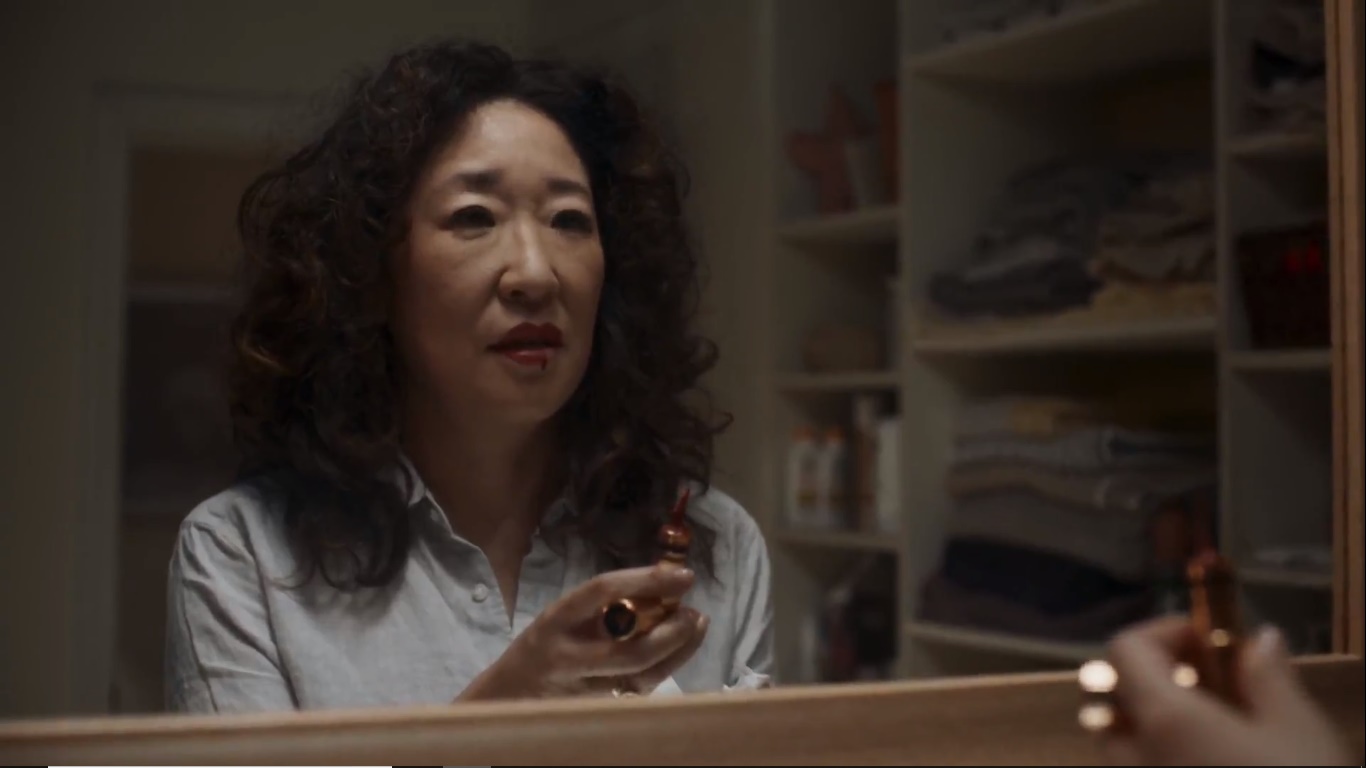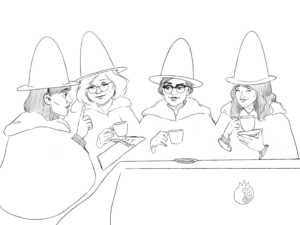Secret agents, murder, and a little romantic tension between two women: it’s the perfect recipe for an enemies to lovers romance, heavy on the angst and extra on the slowburn. It’s also what has everyone clicking that “next episode” button for BBC America’s thriller series Killing Eve. The show revolves around Eve, a super secret agent for the United Kingdom, and her target Villanelle, a super not-all-that-secret assassin for a mysterious group known only as “The Twelve.” Together, they play a game of cat and mouse that has every fanfic writer taking notes. It’s a tantalizing back and forth that pulls them closer and closer together until they’re lying in the same bed, inches apart, nearly touching and… for the love of God, just kiss already!

It’s just too hard to look away.
At least, it is until the inevitable question of morality raises its ugly head in Killing Eve’s newest season. The deeper Eve’s attraction to Villanelle becomes, the more immoral her own thoughts and actions. It goes without question that it’s a little messed up to just let an assassin go around murdering whomever she pleases without some kind of justice (especially if this particular assassin doesn’t just kill for money, but also because it’s fun and, well, she feels like it). But those little quirks don’t stop Eve from pursuing her, they certainly don’t stop the flirting, and they definitely don’t stop the ever-increasing temptation to bite the proverbial apple.
All together though, this creates an uncomfortable parallel. As the only prominent LGBT+ “couple” on the stage, why is it that the more explicit and tied together the two become, the further Eve plummets into the depths of immorality? Rather than showing a complex relationship between two women with hard choices to make, Killing Eve plays into the long-established trope of coding LGBT characters as morally dubious and/or inherently villainous people. It only takes a quick Google search and a walk into TVTropes.org just to see just how many narrative tropes on the list frame LGBT characters as depraved villains.

This “Fall” starts when Eve hires Villanelle to kill none other than herself. In a perfect world, the idea is every fanfic writer’s dream come true. Now more than ever will their two worlds collide, and the choice to capture, kill, or run away into the sunset together keeps us on the edge of our seats. Understandably, none of Eve’s coworkers think this is a good idea. But, instead of trying to convince her otherwise, they decide to have her psychologically evaluated in secret. The results? Apparently, Eve has no qualms about murder—even finds it thrilling—and she is particularly intent on defending Villanelle’s crimes.

It’s not exactly the worst decision done by the writing team—after all, this is a psychological thriller, so why not call a psychologist?—but it does show a lack of consideration for Eve as a character. Rather than try to save Eve from the dangers of her choices (like any good work buddy should), her team instead questions her capacity to make “good” choices. She hasn’t even bitten the apple here, people! And yet she’s already been condemned, shifting the framework of her character from morally grey at worst to someone fully capable of going down the same path of irredeemability as Villanelle.
No one approves of her plan to lure Villanelle out, but only one person actually tries to talk her out of it: Kenny, her boss’s son and Eve’s right hand tech man. At least someone seems to care for Eve’s safety here. Except now, apparently, Eve’s got an evil streak, and after a heated argument where she fires Kenny, she briefly considers pushing an offensive stranger into the line of a running subway.

Wait, hold on. She considers what now? We know that Eve’s made some really, really stupid decisions in the past that have endangered the lives of her family and peers. We know that she’s been pushed to the breaking point of her temper more than once, and we know she’s capable of mortally wounding someone (see: Villanelle’s stomach). Until now, she’s never considered murdering anyone, let alone a random guy who was rude to her. Only now that her relationship with Villanelle has escalated does she suddenly become less of a neutral good and more of… well, maybe a neutral evil.
This sudden change in character also applies to her sex life with Niko. He finds out about Villanelle’s stab wound, and accuses Eve in everything but words that she’s essentially having an affair with a murderer. This isn’t entirely untrue, but their solution to the issue is a night of sex with a violent twist. It might have been smarter to just go to marriage counseling.

There’s nothing wrong with a little BDSM to spice your sex life up, but in this context, it starts to say a whole lot more: the closer Eve gets to a relationship with a woman, the more violent she becomes, both in and out of the bedroom. It intrinsically ties violence into her sexuality, especially as her sexual desires drift away from men. It frames her heterosexual relationship with Niko as the pure garden of Eden, and her relationship with Villanelle as her fall from grace.
Then there’s the culmination of it all: murder in Rome. Just after Eve and Villanelle have what is basically pseudo phone sex, Villanelle forces Eve into a situation where it’s kill or watch her die. They’re coworkers now, partners in the most distant sense, so taking the kill isn’t actually the worst decision to make. She’s just protecting her coworker. So, naturally, she goes at it with an ax while Villanelle sits back and goads her on with a devious smile.

And that’s just it. On top of everything else that the narrative puts Eve through, she’s now forced to kill someone by the only loudly bisexual woman in the show: Villanelle. She is the one behind the scenes pulling Eve’s strings. She is the reason Eve’s morality is put into question. She is the influence that pushes Eve to consider murder. And it is because of Villanelle that Eve lands the killing blow. The closer she gets to Villanelle and the more sexual tension that rises between them, the worse her moral praxis becomes. The only way the two of them are allowed to be together in any romantic or sexual light is during moments of violence and questionable practices. Eve knows this is all wrong, too, and at the bottom of her spiral, she makes the executive decision to leave Villanelle and her murderous nature behind.

As a whole, it’s exciting to see two women come together with angry passion and bad decisions. The fluffy, “let’s hold hands and cuddle” or “distant but wise lesbians” narratives have their limits. Killing Eve’s sexual tension and super secret spywork create the perfect atmosphere for women who are looking for intensity. But, at the end of the day, tropes like “evil bisexual” are more harmful than they are interesting. That doesn’t mean every gay character on the planet should be represented to be as pure as snow. We want to be seen as real people, both flawed and complex. But tying murder and homosexuality together is, to say the least, too far. Eve’s spiraling arc of murder with Villanelle’s explicit lack of morals leave much to be desired. We can only hope that this next season provides more nuance and complexity for both Eve and Villanelle’s characters.




